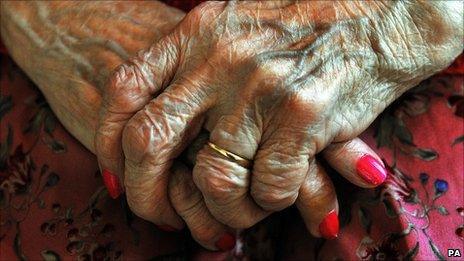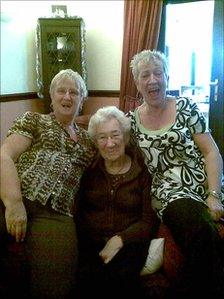Selling a home to pay for elderly care
- Published

Selling a family home to pay for care is "often a difficult decision which many would like to avoid but can't", says charity Age UK
The provision of long-term care in England is under review.
But why, under the current system, do some people feel they have to sell their family home to pay to be looked after in their old age?
Annie Kennedy was diagnosed with Alzheimer's disease just over three years ago.
She had lived alone since her husband died nearly a decade earlier.
The pensioner's two daughters watched helplessly as their octogenarian mother was left baffled and scared by seemingly straightforward tasks in her everyday life.
"My mum was an extremely bright, clever lady. I'm watching the person who looked after me all my life disappearing before my eyes," explained Annie's daughter, Pauline Turner.
She, along with her sister, Barbara, took the difficult decision to move their mother - who is now 89 - into a care home.
"I planned an extension of my bungalow for her to move in, but I couldn't handle it.
"I felt very guilty about her going into a care home, and I still do. But I didn't know if I would have been able to cope."
After a 12-week period funded by the local authority, Pauline's mother was admitted permanently on a self-funding basis.
The annual cost of the care home is nearly £20,000.
In order to pay the fees, the family had to sell Annie's bungalow for £140,000. Her pension is also being used to cover the costs.
Her daughters took out a £56,000 care annuity - an investment used to pay for their mother's care throughout the rest of her life.
This predicament is one that many families across England have faced in recent years.
The Dilnot Commission has looked at England's system of adult social care, which is available to elderly people and younger adults with disabilities, covering everything from help at home to being placed in a residential care home.
'Worrying issue'
It has looked into how people could choose to protect their assets, especially their homes, against the cost of care.
It is expected to recommend a cap of between £25,000 and £35,000 on the total amount an individual should have to pay for their own care, with government picking up the remaining cost.
In England, an individual's care requirements are currently judged on two criteria - means and needs.

Annie Kennedy's daughter, Pauline (left), feels the current care system is unfair
Everyone with savings of more than £23,250 pays for the support they may need for washing, dressing and eating.
If an individual needs a care home place, the £23,250 threshold includes the value of their property.
This has led to a situation in which some people have found themselves, like Annie's daughters, selling a family home.
Even those who qualify through means testing are then assessed for need and councils are obliged to provide care only if they meet a certain threshold.
It is also up to councils to decide, depending on their finances, which of the four thresholds - low, moderate, substantial and critical - they want to set when determining whether to fund care.
In April, a study by the Association of Directors of Adult Social Services found just 26 out of 148 councils would fund people with moderate or low needs.
This follows a sharp reduction in central funding for local authorities.
However, the government said it had recently allocated an extra £2bn a year by 2014-15 for social care services.
A Department of Health spokesman said the practice of selling a family home, and other assets, to pay for care was "a worrying issue for many people and one that has been sidelined for far too long".
He said: "That is why the coalition government acted quickly to establish the Commission on Funding Care and Support, chaired by Andrew Dilnot.
"Once we have received the report, we will consider its findings and welcome continued constructive engagement from all stakeholders."
'Shambles'
Pauline thinks the current system is unfair.
"My parents worked all their lives and paid national insurance and now the state wants all the money back because they don't want to pay for my mum," she said.
"The most important thing is my mum's care. What I object to is that as soon as you sell your property, as an old age pensioner, you lose your pension credit and winter fuel allowance. You lose everything you would've been entitled to if you lived at home.
"All of her rights and dignity have been taken away. The means testing is an absolute shambles."
Pauline's predicament lies at the heart of the Dilnot Commission's remit.
And it seems that her family's experience is not uncommon.
Michelle Mitchell, of Age UK, said selling a family home to pay for care is "often a difficult decision which many would like to avoid but can't".
"The social care system is crumbling and sorting out how to fund current and future needs is an urgent priority.
"Many of the most vulnerable older members of our society are receiving a shocking level of care which shames us all."
She urged the government to "seize this moment" after the Dilnot Commission, by promising a White Paper to "help ensure the desperate worry of how to find and pay for good care is lifted from both families and our society in the future".
- Published11 February 2013
- Published12 May 2011
- Published16 November 2010
- Published8 November 2010